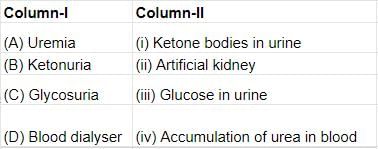Test: Disorders of Excretory System (NCERT) - NEET MCQ
10 Questions MCQ Test - Test: Disorders of Excretory System (NCERT)
The presence of ketone bodies is an indication of which of the following diseases?
What is the inflammation of the glomeruli of the kidney referred to?
Read the given statements regarding human excretory system and select the correct ones.
(i) Presence of glucose in urine is known as uremia.
(ii) Distal convoluted tubule (DCT) selectively secretes hydrogen ions, ammonia and potassium ions anto the filtrate.
(iii) Macula densa formed by cellular modifications in the distal convoluted tubule and the afferent arteriole at their contact location.
(iv) Atrial natriuretic factor (ANF) can cause vasoconstriction when blood flow is low to the atria of the heart.
(i) Presence of glucose in urine is known as uremia.
(ii) Distal convoluted tubule (DCT) selectively secretes hydrogen ions, ammonia and potassium ions anto the filtrate.
(iii) Macula densa formed by cellular modifications in the distal convoluted tubule and the afferent arteriole at their contact location.
(iv) Atrial natriuretic factor (ANF) can cause vasoconstriction when blood flow is low to the atria of the heart.
Match Column-I with Column-II and select the correct option from the codes given below.

Which one of the following is correct with reference to haemodialysis?
What will happen if one kidney is removed from the body of a human being?
Which one of the following is not normally excreted in urine?
A person is undergoing prolonged fasting. His urine would contain abnormal quantities of
An X-ray of the lower abdomen shows a shadow in the region of the ureter suspected to be an ureteric calculus. A possible clinical symptom would be














